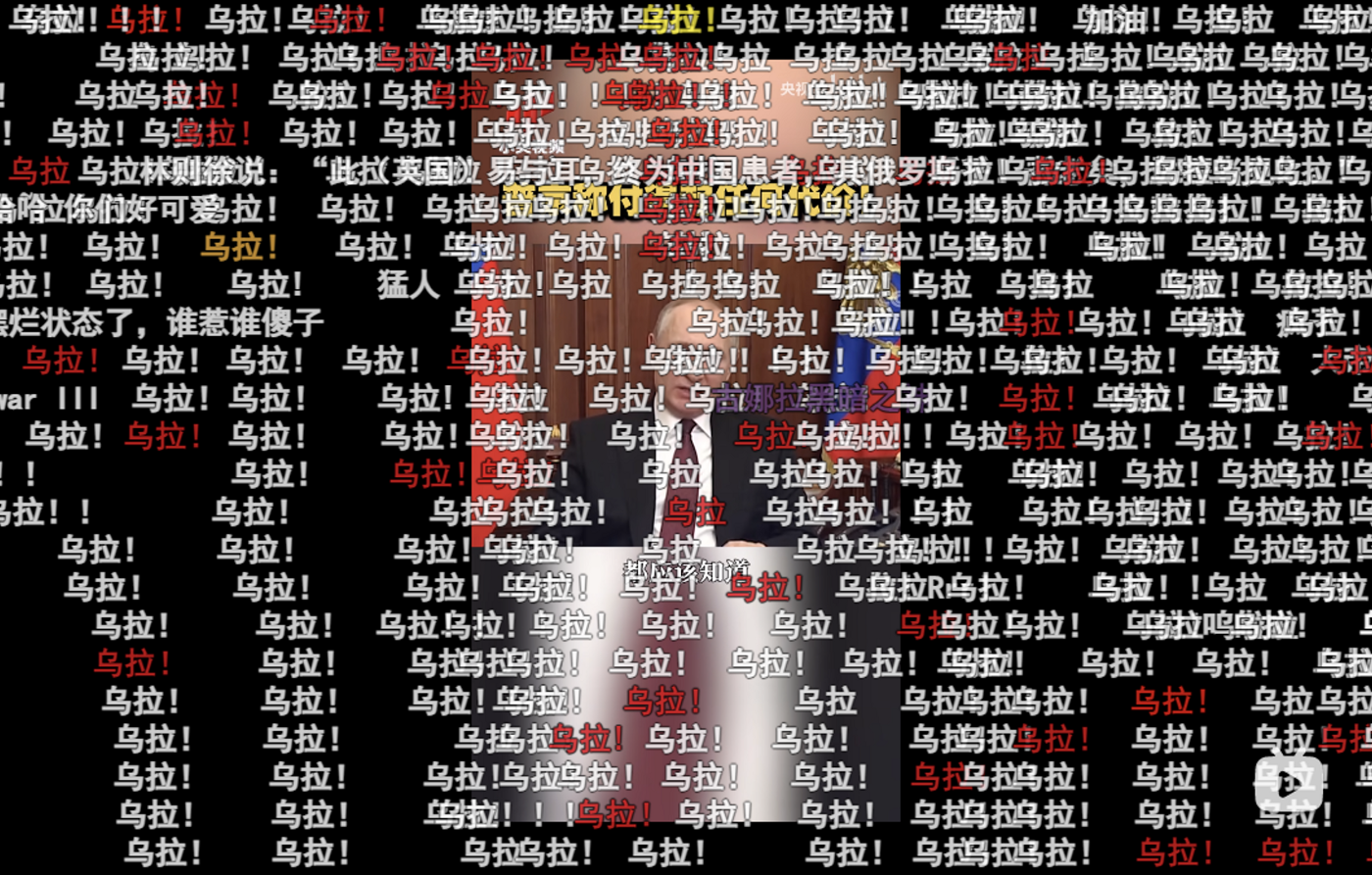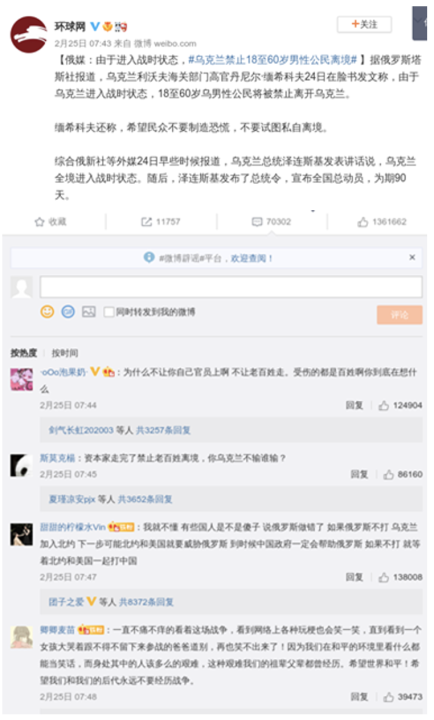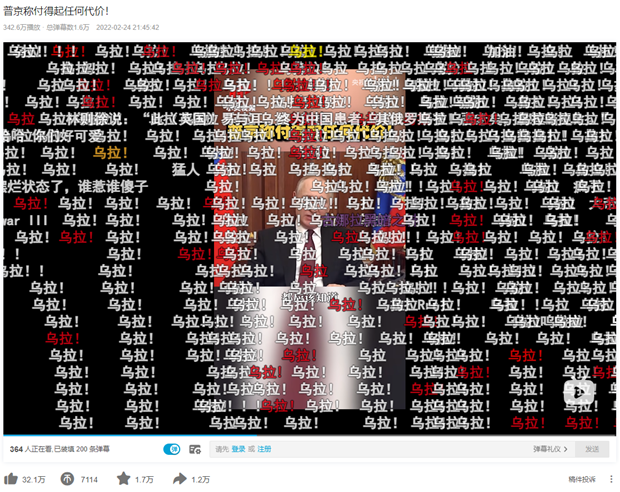Top comments on Chinese social media criticize the West while supporting Putin
Most popular comments on Weibo and Bilibili express support for Russia invading Ukraine.
Top comments on Chinese social media criticize the West while supporting Putin
Share this story
THE FOCUS

BANNER: Bilibili video in support of Vladimir Putin overlaid by users with the war cry, “Ura!” (Source: Bilibili)
Before Russia invaded Ukraine, users on the Chinese social media platform Weibo reacted to the possibility of an invasion with skepticism, projecting largely anti-Western sentiment. On January 25, for instance, the Weibo account run by the US Embassy in China published a post detailing “truths and lies” regarding the potential invasion. Chinese users responded with mocking reaction images, skeptical comments, and references to Iraq. In other widely shared posts on the platform, the top comments reveal some of the sentiments felt by Weibo users, such as “I understand the importance of the ‘War to Resist America and Aid Korea’ more and more,” and “While the White House and the Kremlin are arguing, Gugong’s snacking.”
General sentiment on Weibo did not significantly shift once the invasion commenced. Users predominately expressed either a pro-Russia or ambivalent stance, though some raised concerns about the war’s human cost. Users also contemplated what the invasion meant for China’s strategic competition with the United States.
For example, a Weibo post by Chinese state media outlet Global Times regarding Ukraine prohibiting men ages 18 to 60 from leaving Ukraine garnered more than 1.3 million likes and nearly 70,000 reposts, making it the most popular post since the war started.
Among the top replies to the post, as translated by the DFRLab:
“Why don’t the officials go to war and let the people go? The people are the ones hurting; what are you thinking?” (124,000+ likes)
“The capitalists all left, but the people can’t leave. Ukraine, you are sure to lose.” (86,000+ likes)
“I just don’t get it. Are some Chinese people stupid, saying Russia did something wrong? If Russia doesn’t fight, Ukraine will join NATO. The next step might be NATO and the US threatening Russia. Then the Chinese government will definitely help Russia. If they don’t fight, we are just waiting for NATO and the US to fight China together.” (138,000+ likes)
“I’ve always been superficially watching this war, sometimes chuckling at an online meme, until I saw a child crying not wanting her father to leave, then I couldn’t laugh anymore! Because we are living in a peaceful environment, anything can be a joke. However, the pain felt by these people is the same as the pain felt by our forefathers. I wish for world peace! I hope that we and the next generation will never go through war.” (39,000+ likes)

When the invasion began, a statement from the Chinese Embassy in Ukraine suggested Chinese citizens in the country should display a Chinese flag on their car, implying it would ensure their safe passage. However, Chinese people in Ukraine were not keen to display their identity, partly because of crude memes about the Chinese circulating in the country. One such meme proclaimed Chinese men are searching for Ukrainian refugee brides. Growing distrust between the two communities has made life more difficult for the Chinese in the conflict zone. Radio Free Asia cited reports of Chinese students receiving hostile remarks from Ukrainians knowledgeable of the meme, prompting physical avoidance in bomb shelters and avoidance of admitting to being Chinese.
The second most popular post on Weibo following the invasion reflected this sentiment, warning Chinese citizens in Ukraine to remain cautious. It also included a hashtag that reads in translation, “Chinese citizens in Ukraine should not casually show identity,” in contradiction to the Chinese embassy’s statement to mark cars with Chinese flags. Anti-Chinese memes also prompted action by Weibo, which temporarily suspended 74 accounts for 30 days. A post by the Chinese tabloid Guancha condemning the memes was the third most popular Weibo post regarding Ukraine.
Bilibili, a video platform popular with Chinese youth, also hosts independent and state media content about the Ukraine war. Several popular explainer videos describe Western imperialism or NATO expansion as the cause of the conflict, creating narrative frame for other users to discuss the topic. Although there are those whose comments call for a peaceful solution, comments that favor the Russians or blame the US received the majority of likes, suggesting that most users on this platform interested in the topic are favoring the Russian perspective. Comments on videos by Ukrainian influencers have been far less political, with commenters wishing for their safety, though it is possible that negative or hostile comments have already been removed by content moderators.
For example, in a viral explainer video published by Guancha, the top two comments stated:
“In conclusion: America wrongly accuses Russia of eating two bowls of noodles, so Russia eats two more bowls in front of it.” (21,000+ likes)
“No matter how people say Russia is evil, it still won’t break China-Russia cooperation. No matter how people say the West is good, it still won’t change our resistance against it. There certainly are truths, but read the room: those who like to express opposing views received American dollars.” (16,000+ likes)

One feature of Bilibili is the ability to overlay comments on videos. In a video titled “Putin claims he can pay any price,” Internet users spammed it with the Russian war cry, “Ura!”

Cite this case study:
“Top comments on Chinese social media criticize the West while supporting Putin,” Digital Forensic Research Lab (DFRLab), March 1, 2022, https://medium.com/dfrlab/top-comments-on-chinese-social-media-criticize-the-west-while-supporting-putin-ace9817d5af5.

